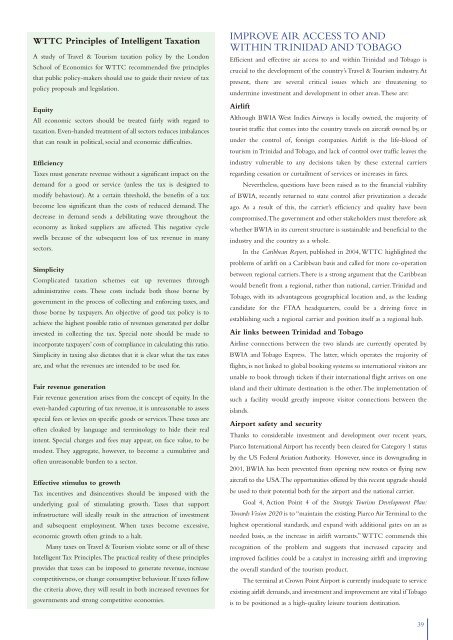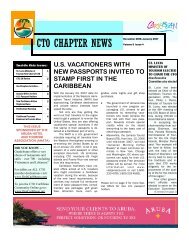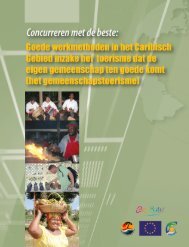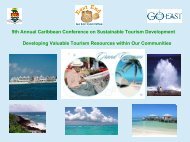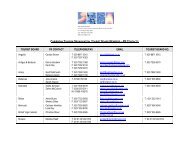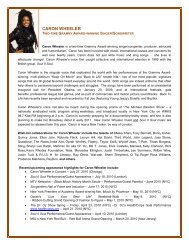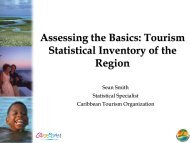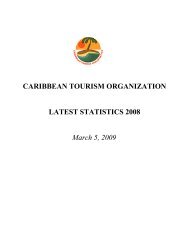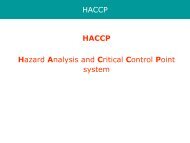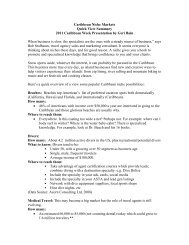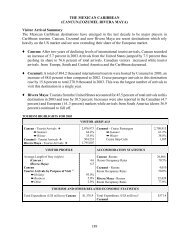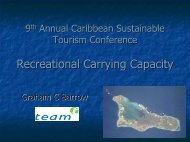TRINIDAD AND TOBAGO - Caribbean Tourism Organization
TRINIDAD AND TOBAGO - Caribbean Tourism Organization
TRINIDAD AND TOBAGO - Caribbean Tourism Organization
Create successful ePaper yourself
Turn your PDF publications into a flip-book with our unique Google optimized e-Paper software.
WTTC Principles of Intelligent Taxation<br />
A study of Travel & <strong>Tourism</strong> taxation policy by the London<br />
School of Economics for WTTC recommended five principles<br />
that public policy-makers should use to guide their review of tax<br />
policy proposals and legislation.<br />
Equity<br />
All economic sectors should be treated fairly with regard to<br />
taxation. Even-handed treatment of all sectors reduces imbalances<br />
that can result in political, social and economic difficulties.<br />
Efficiency<br />
Taxes must generate revenue without a significant impact on the<br />
demand for a good or service (unless the tax is designed to<br />
modify behaviour). At a certain threshold, the benefits of a tax<br />
become less significant than the costs of reduced demand. The<br />
decrease in demand sends a debilitating wave throughout the<br />
economy as linked suppliers are affected. This negative cycle<br />
swells because of the subsequent loss of tax revenue in many<br />
sectors.<br />
Simplicity<br />
Complicated taxation schemes eat up revenues through<br />
administrative costs. These costs include both those borne by<br />
government in the process of collecting and enforcing taxes, and<br />
those borne by taxpayers. An objective of good tax policy is to<br />
achieve the highest possible ratio of revenues generated per dollar<br />
invested in collecting the tax. Special note should be made to<br />
incorporate taxpayers’ costs of compliance in calculating this ratio.<br />
Simplicity in taxing also dictates that it is clear what the tax rates<br />
are, and what the revenues are intended to be used for.<br />
Fair revenue generation<br />
Fair revenue generation arises from the concept of equity. In the<br />
even-handed capturing of tax revenue, it is unreasonable to assess<br />
special fees or levies on specific goods or services.These taxes are<br />
often cloaked by language and terminology to hide their real<br />
intent. Special charges and fees may appear, on face value, to be<br />
modest. They aggregate, however, to become a cumulative and<br />
often unreasonable burden to a sector.<br />
Effective stimulus to growth<br />
Tax incentives and disincentives should be imposed with the<br />
underlying goal of stimulating growth. Taxes that support<br />
infrastructure will ideally result in the attraction of investment<br />
and subsequent employment. When taxes become excessive,<br />
economic growth often grinds to a halt.<br />
Many taxes on Travel & <strong>Tourism</strong> violate some or all of these<br />
Intelligent Tax Principles.The practical reality of these principles<br />
provides that taxes can be imposed to generate revenue, increase<br />
competitiveness, or change consumptive behaviour. If taxes follow<br />
the criteria above, they will result in both increased revenues for<br />
governments and strong competitive economies.<br />
IMPROVE AIR ACCESS TO <strong>AND</strong><br />
WITHIN <strong>TRINIDAD</strong> <strong>AND</strong> <strong>TOBAGO</strong><br />
Efficient and effective air access to and within Trinidad and Tobago is<br />
crucial to the development of the country’s Travel & <strong>Tourism</strong> industry.At<br />
present, there are several critical issues which are threatening to<br />
undermine investment and development in other areas.These are:<br />
Airlift<br />
Although BWIA West Indies Airways is locally owned, the majority of<br />
tourist traffic that comes into the country travels on aircraft owned by, or<br />
under the control of, foreign companies. Airlift is the life-blood of<br />
tourism in Trinidad and Tobago, and lack of control over traffic leaves the<br />
industry vulnerable to any decisions taken by these external carriers<br />
regarding cessation or curtailment of services or increases in fares.<br />
Nevertheless, questions have been raised as to the financial viability<br />
of BWIA, recently returned to state control after privatization a decade<br />
ago. As a result of this, the carrier’s efficiency and quality have been<br />
compromised.The government and other stakeholders must therefore ask<br />
whether BWIA in its current structure is sustainable and beneficial to the<br />
industry and the country as a whole.<br />
In the <strong>Caribbean</strong> Report, published in 2004,WTTC highlighted the<br />
problems of airlift on a <strong>Caribbean</strong> basis and called for more co-operation<br />
between regional carriers.There is a strong argument that the <strong>Caribbean</strong><br />
would benefit from a regional, rather than national, carrier.Trinidad and<br />
Tobago, with its advantageous geographical location and, as the leading<br />
candidate for the FTAA headquarters, could be a driving force in<br />
establishing such a regional carrier and position itself as a regional hub.<br />
Air links between Trinidad and Tobago<br />
Airline connections between the two islands are currently operated by<br />
BWIA and Tobago Express. The latter, which operates the majority of<br />
flights, is not linked to global booking systems so international visitors are<br />
unable to book through tickets if their international flight arrives on one<br />
island and their ultimate destination is the other.The implementation of<br />
such a facility would greatly improve visitor connections between the<br />
islands.<br />
Airport safety and security<br />
Thanks to considerable investment and development over recent years,<br />
Piarco International Airport has recently been cleared for Category 1 status<br />
by the US Federal Aviation Authority. However, since its downgrading in<br />
2001, BWIA has been prevented from opening new routes or flying new<br />
aircraft to the USA.The opportunities offered by this recent upgrade should<br />
be used to their potential both for the airport and the national carrier.<br />
Goal 4, Action Point 4 of the Strategic <strong>Tourism</strong> Development Plan:<br />
Towards Vision 2020 is to “maintain the existing Piarco Air Terminal to the<br />
highest operational standards, and expand with additional gates on an as<br />
needed basis, as the increase in airlift warrants.” WTTC commends this<br />
recognition of the problem and suggests that increased capacity and<br />
improved facilities could be a catalyst in increasing airlift and improving<br />
the overall standard of the tourism product.<br />
The terminal at Crown Point Airport is currently inadequate to service<br />
existing airlift demands, and investment and improvement are vital if Tobago<br />
is to be positioned as a high-quality leisure tourism destination.<br />
39


